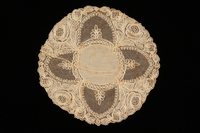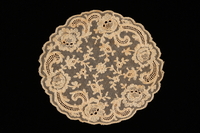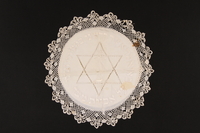Overview
- Brief Narrative
- Embroidered floral weblike doily made by Rita Grunbaum after the war. She was living in Rotterdam with her husband, Manfred, when Nazi Germany invaded the country on May 10, 1940. Jews became targets of official persecution. Manfred was arrested but quickly released in October 1941. Rita and Manfred decided to have a child to show faith in the future and their daughter, Dorien, was born on August 28, 1942. A year later, two SS men and a Dutch policemen came and arrested them on September 29, 1943. While in the local police station, they considered giving their baby to a non-Jewish woman about to be released, but decided that the family should stay together. They were sent to Westerbork transit camp, and then to Bergen-Belsen concentration camp. On April 9, 1945, the Germans began to evacuate the camp because of advancing Allied forces and the inmates were loaded onto trains. Their guards abandoned them near Troebitz, Germany, and with the arrival of Soviet Forces on April 23, they realized that they were free. The family returned to Holland on July 1, 1945.
- Date
-
creation:
approximately 1945
- Geography
-
creation:
Rotterdam (Netherlands)
- Credit Line
- United States Holocaust Memorial Museum Collection, Gift of Dorien Grunbaum
- Contributor
-
Subject:
Dorien Grunbaum
Subject: Rita Grunbaum
- Biography
-
Dorien Grunbaum was born August 28, 1942, in Rotterdam, Netherlands, to Rita Van Leeuwen, who was born on April 9, 1910, in Rotterdam, and Manfred Grunbaum, who was born November 20, 1903, in Frankfurt, Germany. Her paren married in 1936. Her mother was trained as a social worker and the couple operated a grain import/export business. Nazi Germany invaded the Netherlands in May 1940. By 1942, there were frequent deportations of Jews to concentration camps in Poland. But Rita and Manfred decided that having a child would express thier faith in an end to the war. On September 29, 1943, two German SS-men and one Dutch policeman came to arrest her parents. While the family was detained at local German headquarters, her parents had an opportunity to give one year old Dorien to a non-Jewish woman to protect her, but they decided to stay together. The family was sent to Westerbork transit camp. During this time, Manfred’s parents, who had escaped to Mexico before the German invasion, arranged for them to receive certificates to Palestine. These would supposedly make them eligible for possible exchange for German prisoners-of-war held by the British in Palestine. On February 14, 1944, the family was sent to Bergen-Belsen concentration camp in Germany. Dorien stayed with her mother in the women’s quarters. That winter, conditions in the camp worsened to below subsistence levels. The camp was packed with tens of thousands prisoners from concentration camps in Poland as the Germans evacuated the area to escape the advancing Soviet Army. Dorien was very ill with pneumonia and an ear infection. In April 9, 1945, the Grunbaum family and other prisoners were put onto a train for evacuation. They were on the train for two weeks, with almost no food, but only went 50 miles as the train was constantly diverted to avoid allied bombings. On April 23, 1945, the German guards disappeared near the town of Troebitz, Germany. Soon they saw Soviet troops and knew that they were free. Both her parents were ill with typhus and the family was taken to a Russian hospital. When they could all travel, an American medical train took the family back to Holland, where they arrived on July 1, 1945. They later immigrated to the United States where another daughter was born. Manfred died, age 63, on March 2, 1967. Rita, age 96, passed away on August 6, 2006.
Rita Van Leeuwen was born in Rotterdam, Netherlands, on April 9, 1910, to Salomon van Leeuwen and Selma Gerzon. Rita trained as a social worked and, in 1936, married Manfred Grunbaum, born November 20, 1903, who was originally from Frankfurt, Germany. Together they ran a grain import/export business. Manfred’s parents left Holland for Mexico before the German invasion on May 10, 1940. Rita and Manfred remained in Holland to stay with her mother. Manfred was arrested and interrogated in October 1941, but soon was released. The Germans enacted increasingly punitive anti-Jewish legislation:; Jews were required to wear a yellow Star of David, and forbidden from using public transportation, owning radios or telephones, or holding many types of jobs. Round-ups of Jews for deportation and imprisonment became common. Despite this, Rita persuaded Manfred that they should have a child as an expression of their optimism that the war would end soon. A daughter, Dorien, was born on August 28, 1942. On September 29, 1943, two German SS agents and a Dutch policeman came to arrest the family. They were held in the German headquarters in Rotterdam. In detention with them was a non-Jewish woman who had been arrested by mistake. When the woman was released, the Grunbaum's considered giving Dorien, who was not on the police list, to her for safekeeping, but they decided to stay together as a family. They were sent to Westerbork transit camp and remained there for several months. Manfred served as forced labor building roads. During that time, Manfred’s parents in Mexico arranged for them to receive Red Cross certificates registering them for prisoner exchange and for entry into Palestine. Because of these certificates, the Grunbaum’s were sent to Bergen-Belsen concentration camp on February 14, 1944, where it was possible they could be exchanged for German prisoners of war. They were placed in the Sternlager section of the camp. Men and women were housed separately and Rita would later say that having her baby to take care of is what saved her. Conditions there were not as harsh as those at other camps, but inmates often had to stand in the yards in the cold and snow for roll-calls that might last 10 hours. They were weakened by malnutrition and disease. Manfred contracted jaundice and Dorien contracted pneumonia and an ear infection. During the winter of 1944-1945, as the Soviet Army advanced from the East, tens of thousands of evacuees from concentration camps in Poland were brought to Bergen-Belsen. The prisoner population grew from 4000 to 70,000 and mortality increased. Typhoid plagued the prisoners, there was almost no food, and sanitary conditions were horrible. On April 9, 1945, the camp was evacuated and the inmates were forced onto a train. The journey lasted two weeks and food was scarce. Many people died on the train which was supposedly headed to Theresienstadt. On April 23, 1945, the German guards disappeared near the town of Troebitz, Germany. Soon Soviet forces appeared and they realized they were free. Rita was sick with typhus and after she recovered, Manfred fell ill with the disease and was taken to a Russian hospital. On June 23, when he was well enough to travel, the Red Cross transported the family to Leipzig, Germany. From there, they were put on an American medical train to Holland, where they arrived on July 1, 1945. The family later immigrated to the United States where another daughter was born. Rita continued her career as a social worker and was an eloquent Holocaust educator. Manfred died, age 63, on March 2, 1967. Rita published a memoir in 2005. Rita passed away, age 96, on August 26, 2006, in Larchmont, NY.
Physical Details
- Classification
-
Decorative Arts
- Category
-
Needlework
- Object Type
-
Doilies (lcsh)
- Physical Description
- Circular crocheted white doily with an embroidered eight-point flower filling the center and a weblike border.
- Dimensions
- overall: | Diameter: 10.625 inches (26.988 cm)
- Materials
- overall : yarn
Rights & Restrictions
- Conditions on Access
- No restrictions on access
- Conditions on Use
- No restrictions on use
Keywords & Subjects
Administrative Notes
- Legal Status
- Permanent Collection
- Provenance
- The doily was donated to the United States Holocaust Memorial Museum in 2008 by Dorien Grunbaum. the daughter of Manfred and Rita Grunbaum.
- Record last modified:
- 2022-07-28 21:51:04
- This page:
- https://collections.ushmm.org/search/catalog/irn36258
Download & Licensing
In-Person Research
- By Appointment
- Request 21 Days in Advance of Visit
- Plan a Research Visit
- Request to See This Object
Contact Us
Also in Dorien Grunbaum family collection
The collection consists of artifacts, correspondence, documents, and photographs related to the experiences of Manfred and Rita Grunbaum and their daughter, Dorien, in the Netherlands, Westerbork transit camp, and Bergen-Belsen concentration camp before and during the Holocaust, and in Germany, the Netherlands, and the United States in the postwar period.
Date: 1938-1945

Lace doily with net semi-circles and floral design recovered by Dutch Jewish family
Object
Lace doily with large net semi-circles and embroidered flowers recovered by Rita Grunbaum in the Netherlands after the war. She was living in Rotterdam with her husband, Manfred, when Nazi Germany invaded the country on May 10, 1940. Jews became targets of official persecution. Manfred was arrested but quickly released in October 1941. Rita and Manfred decided to have a child to show faith in the future and their daughter, Dorien, was born on August 28, 1942. A year later, two SS men and a Dutch policemen came and arrested them on September 29, 1943. While in the local police station, they considered giving their baby to a non-Jewish woman about to be released, but decided that the family should stay together. They were sent to Westerbork transit camp, and then to Bergen-Belsen concentration camp. On April 9, 1945, the Germans began to evacuate the camp because of advancing Allied forces and the inmates were loaded onto trains. Their guards abandoned them near Troebitz, Germany, and with the arrival of Soviet Forces on April 23, they realized that they were free. The family returned to Holland on July 1, 1945.

White net doily with embroidered flowers recovered by a Dutch Jewish family
Object
Embroidered floral net doily recovered by Rita Grunbaum in the Netherlands after the war. She was living in Rotterdam with her husband, Manfred, when Nazi Germany invaded the country on May 10, 1940. Jews became targets of official persecution. Manfred was arrested but quickly released in October 1941. Rita and Manfred decided to have a child to show faith in the future and their daughter, Dorien, was born on August 28, 1942. A year later, two SS men and a Dutch policemen came and arrested them on September 29, 1943. While in the local police station, they considered giving their baby to a non-Jewish woman about to be released, but decided that the family should stay together. They were sent to Westerbork transit camp, and then to Bergen-Belsen concentration camp. On April 9, 1945, the Germans began to evacuate the camp because of advancing Allied forces and the inmates were loaded onto trains. Their guards abandoned them near Troebitz, Germany, and with the arrival of Soviet Forces on April 23, they realized that they were free. The family returned to Holland on July 1, 1945.

Matzoh cover with an embroidered Star of David, kiddush cup, and Hebrew inscription recovered postwar by a Dutch Jewish family
Object
Embroidered white matzoh cover with a Star of David, goblet, and Hebrew inscription recovered after the war by Rita Grunbaum. The inscription includes the date 1919 and the blessing over the matzoh that is recited at the seder. Rita was living in Rotterdam with her husband, Manfred, when Nazi Germany invaded the country on May 10, 1940. Jews became targets of official persecution. Manfred was arrested but quickly released in October 1941. Rita and Manfred decided to have a child to show faith in the future and their daughter, Dorien, was born on August 28, 1942. A year later, two SS men and a Dutch policemen came and arrested them on September 29, 1943. While in the local police station, they considered giving their baby to a non-Jewish woman about to be released, but decided that the family should stay together. They were sent to Westerbork transit camp, and then to Bergen-Belsen concentration camp. On April 9, 1945, the Germans began to evacuate the camp because of advancing Allied forces and the inmates were loaded onto trains. Their guards abandoned them near Troebitz, Germany, and with the arrival of Soviet Forces on April 23, they realized that they were free. The family returned to Holland on July 1, 1945.
Dorien Grunbaum family papers
Document
Documents, correspondence and photographs illustrating the experiences of Manfred and Rita Grunbaum, and their daughter Dorien [donor], before, during, and after the Holocaust in the Netherlands and Germany; includes letters sent between Manfred in the Netherlands and family in Mexico, pre-war photographs, and post-war writings. Dorien Grunbaum was born in 1942 in the Netherlands and was deported with her parents to the Westerbork internment camp and then to the Bergen-Belsen concentration camp in Germany. From there they were sent by train from which they were liberated in April 1945.



